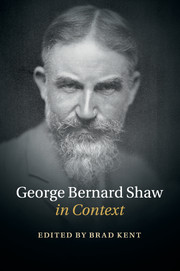Book contents
- Frontmatter
- Dedication
- Contents
- List of illustrations
- Notes on contributors
- Preface
- Acknowledgements
- A Chronology of Shaw's Works
- List of abbreviations
- PART I PEOPLE AND PLACES
- PART II THEATRE
- 7 The Abbey Theatre
- 8 Actors and actresses
- 9 The Court Theatre
- 10 Fabian drama
- 11 Farcical comedy
- 12 History plays
- 13 Melodrama
- 14 The New Drama
- PART III WRITING AND THE ARTS
- PART IV POLITICS
- PART V CULTURE AND SOCIETY
- PART VI RECEPTION AND AFTERLIFE
- Further reading
- Index
- References
14 - The New Drama
from PART II - THEATRE
Published online by Cambridge University Press: 05 October 2015
- Frontmatter
- Dedication
- Contents
- List of illustrations
- Notes on contributors
- Preface
- Acknowledgements
- A Chronology of Shaw's Works
- List of abbreviations
- PART I PEOPLE AND PLACES
- PART II THEATRE
- 7 The Abbey Theatre
- 8 Actors and actresses
- 9 The Court Theatre
- 10 Fabian drama
- 11 Farcical comedy
- 12 History plays
- 13 Melodrama
- 14 The New Drama
- PART III WRITING AND THE ARTS
- PART IV POLITICS
- PART V CULTURE AND SOCIETY
- PART VI RECEPTION AND AFTERLIFE
- Further reading
- Index
- References
Summary
The Second Mrs Tanqueray, staged at the St James's in May 1893, opened to widespread claims of innovation, realism, and artistic achievement. Its author, Arthur Wing Pinero, immediately joined Henry Arthur Jones as a leading exponent of what was soon known as ‘the New Drama’. It propelled its lead actress, Stella (Mrs Pat) Campbell, to stardom and the accolade of a portrait by Aubrey Beardsley in the first issue of The Yellow Book. The Quarterly Review, echoing other commentators, maintained in 1895, ‘novelty is the keynote of the dying century. With the “New Woman” and the “New Humour” we also have the “New Drama”’. Shaw, in 1898, would agree that ‘we of course called everything advanced “the New” at that time’ (CPP I: 16), but added, with characteristic scepticism, ‘a great deal of talk about “the New Drama” followed by the actual establishment of a “New Theatre” (the Independent), threatened to end in the humiliating discovery that the New Drama, in England at least, was a figment of the revolutionary imagination’ (CPP I: 371) As this suggests, definitions are slippery not least because the division of theatre into ‘mainstream’ and ‘alternative’, ‘commercial’ and ‘independent’, that would continue for the next century and more, was emerging in the 1890s, as were ideas about what theatrical innovation might entail.
Praise for The Second Mrs Tanqueray was, though, all but unanimous. The Era judged that ‘the shock caused by the realism of the subject might be described as electrical’ and the Pall Mall Gazette that ‘at last an English play has been produced which can be seriously saluted as a work of art’. Henry James found the rejection of a happy ending ‘momentous’ and, although the respected critic, A. B. Walkley, felt that ‘a life of dismal monotonous suffering for her own past would have been a more truly tragic expiation’, he admired the thrust of the play.
- Type
- Chapter
- Information
- George Bernard Shaw in Context , pp. 109 - 116Publisher: Cambridge University PressPrint publication year: 2015



